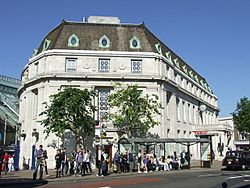Municipal Borough of Wimbledon facts for kids
| Wimbledon | |
| Motto: Sine Labe Decus (Honour without stain) | |
 Wimbledon Town Hall |
|
| Geography | |
| Status | local board (1866 - 1894) urban district (1894 - 1905) municipal borough (after 1905) |
| 1911 area | 3,221 acres (13.03 km2) |
| 1961 area | 3,221 acres (13.03 km2) |
| HQ | Wimbledon Town Hall (1931–1965) |
| History | |
| Created | 1866 |
| Abolished | 1965 |
| Succeeded by | London Borough of Merton |
Quick facts for kids Demography |
|
|---|---|
| 1901 population | 41,652 |
| 1961 population | 57,312 |
Wimbledon was a special area in north-east Surrey that had its own local government. This was from 1866 to 1965. It included the town of Wimbledon and the places around it. Wimbledon was also part of the London postal district and the area covered by the Metropolitan Police District.
Contents
Wimbledon's Government History
How Wimbledon Got Its Own Government
Imagine a town needing its own rules and services. In 1866, Wimbledon decided to take charge. It formed a "local board" with 15 members. This board helped manage the area. They made decisions about things like health and local services. This change happened because of a law called the Local Government Act 1858.
Later, in 1894, another law changed things again. Wimbledon became an "urban district." This was a step up for its local government.
Becoming a Municipal Borough
Wimbledon kept growing and becoming more important. So, in 1905, it was given a special "charter." This meant it became a "municipal borough." Think of it as a town getting more power to run itself.
With this new status, the urban district council was replaced. A new "borough council" was created. This council had a mayor, who was the leader. It also had six "aldermen" and eighteen "councillors." These people were elected to help run the town.
Wimbledon's Town Hall
Every important town needs a place for its government. Wimbledon's first Town Hall was on The Broadway. But as the town grew, a bigger one was needed. A new, grander Town Hall was built in 1931. It was located at the corner of Queen's Road and Wimbledon Bridge. This building became the heart of Wimbledon's local government.
The Borough's Coat of Arms
In 1906, Wimbledon was given its very own coat of arms. This was a special symbol, like a logo, for the borough. It told a story about Wimbledon's past.
- A black double-headed eagle was included. This came from an old story. The legend says that Julius Caesar once camped on Wimbledon Common.
- A sheaf of corn was also part of the design. This symbol was borrowed from the Cecil family. They were important in Wimbledon's history.
- Above the crown, you can see two Cornish Choughs. These birds were taken from the coat of arms of Thomas Cromwell. He was another important historical figure linked to the area.
The new borough also chose a motto. It was "Sine Labe Decus". This Latin phrase means "Honour without Stain". It was a proud statement for the town.
Changes in Government
In 1914, Wimbledon tried to become a "county borough." This would have given it even more independence. However, this plan did not succeed.
Wimbledon's time as a municipal borough ended in 1965. This happened because of a new law called the London Government Act 1963. The area of Wimbledon was then moved into Greater London. It joined with the Municipal Borough of Mitcham and the Merton and Morden Urban District. Together, these areas formed the new London Borough of Merton. This is the local government area that exists today.
 | Anna J. Cooper |
 | Mary McLeod Bethune |
 | Lillie Mae Bradford |

